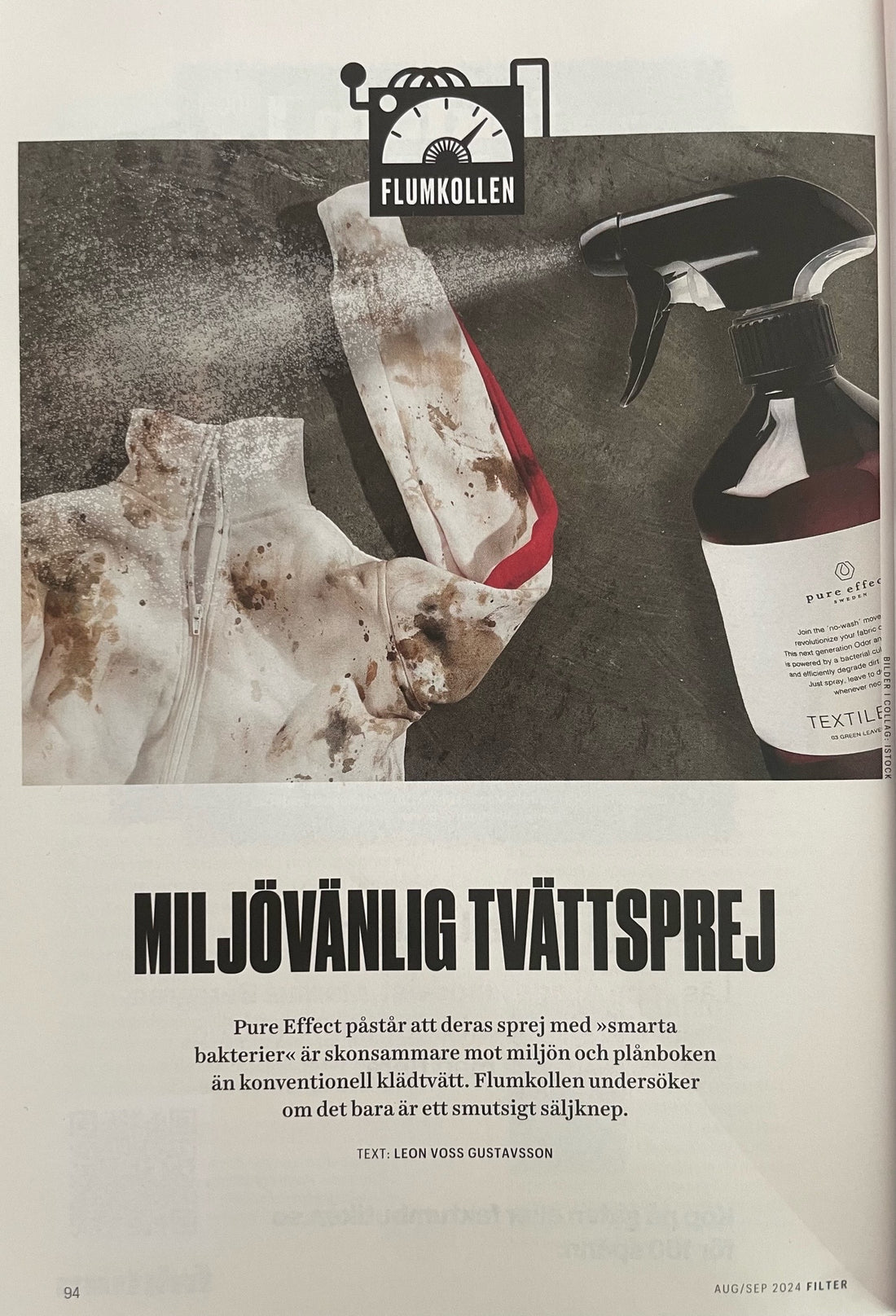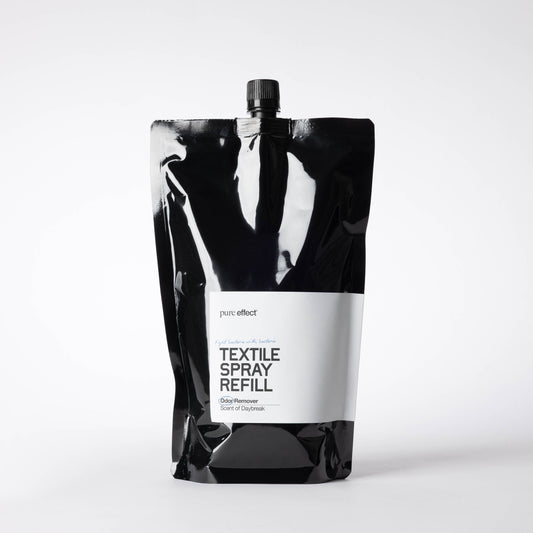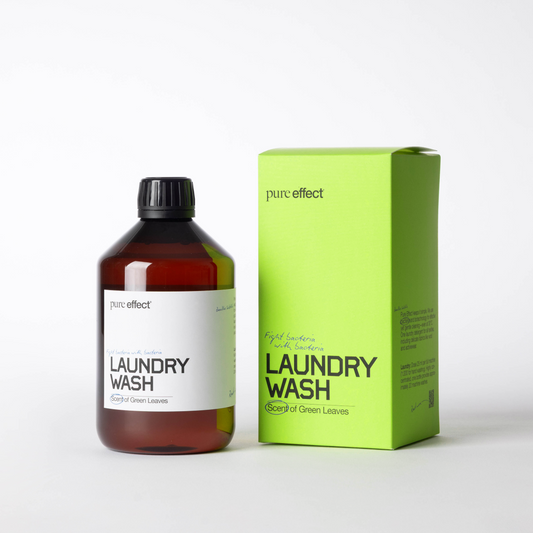
Eco-Friendly Cleaning Spray – A Dirty Marketing Trick? Asks Filter
In the latest issue of the magazine Filter, journalist Leon Voss Gustavsson questions Pure Effect in the series "Flumkollen." We are used to questions, and sometimes skepticism. Change is rarely easy, and we aim to introduce both new technology and changes in habits, behaviors, and attitudes toward cleanliness, bacteria, and laundry. And we really appreciate questions because they give us the chance for dialogue. Unfortunately, we couldn’t find any email or outreach from the journalist in other channels, but we would love the opportunity to address the questions. Therefore, we’re summarizing our responses here in ten points. It’s a long read, but the questions are many and deserve detailed answers.
"Pure Effect claims their spray with ‘smart bacteria’ is gentler on the environment and your wallet than conventional laundry."
The textile industry accounts for about 10% of global CO2 emissions—this is an industry that must transition from linear to circular practices. A significant part of this transition involves consuming less, focusing on quality, and extending the life of garments and items. Here, our work to reduce global laundry by 30% can make a significant impact if we hang and spray our clothes instead of habitually tossing them into the laundry basket.
We don’t talk about “smart” bacteria as far as we know. They are what they are—their sole purpose is to “eat,” grow, and divide. What is smart, however, is utilizing bacteria and other microorganisms and their processes in a resource-efficient way. They act like tiny micro-factories producing enzymes and other substances that we can benefit from. It’s also smart not to wash clothes unnecessarily, as this saves wear and tear on fibers, water, energy, and the release of microplastics and chemicals. The movement of like-minded individuals focused on reducing laundry is called the no-wash (or low-wash) movement. It’s a smart mindset and a behavioral change that our spray can support, as it effectively removes odors and many fresh stains. Listen to the podcast episode "How we care for textiles – or most of the time not" with Professor Vincent Nierstrasz at the Swedish School of Textiles in Borås to learn more about the consequences of laundry.
"Flumkollen investigates whether it’s just a dirty marketing trick."
"Instead of the usual promises of better gut flora, dirt and odors are supposed to disappear: Replace your washing machine with a few sprays of bacterial spray!"
Dirty marketing tricks are the last thing we’d want to engage in, of course. We aim to be as transparent and educational as possible. Biotechnological cleaning is not new—it has been used in professional cleaning for the past 20 years. And the application of spraying clothes to remove odors works. Try it!
In the past year, we’ve introduced the promise that our spray also removes many stains, provided they’re fresh and "organic," such as coffee or sweat (but not nail polish or motor oil). And yes, it can take a little time—let the formula work and reapply the spray if necessary. We offer an odor guarantee and a 30-day return policy so that anyone who tries it can feel confident that they can get their money back if they feel it doesn’t work. This has only happened three times in five years. Check Trustpilot, where customers give us an average rating of 4.7 out of 5 and label us as "Excellent." We don’t think we could achieve such ratings with placebo or “dirty marketing tricks.”
"The company claims their cleaning formula is less harsh on clothing."
It’s a fact that traditional laundry mechanically wears down clothing. See, for example, Naturvårdsverket:
Textile Smart Tips and Advice for Consumers (in Swedish)
Spraying clothing involves zero mechanical processing or wear. Pure Effect’s spray is pH-neutral, making it gentle on fibers, akin to linen water but with a cleaning effect rather than just a fragrance. Spot cleaning (removing stains) is gentler than tossing an entire garment into the washing machine. A study by the Swedish Consumers’ Association found that only 7% of an average Swedish laundry basket needs washing—the rest is tossed in out of habit. Why? We want to encourage people to think differently, try new, more sustainable behaviors, and use bacteria and biotechnology as enablers for this change.
"They also link to various news articles about the new ‘macrobiotic’ world of ideas."
We’re not familiar with the term “macrobiotic” and don’t believe we use it. It’s likely the journalist is referring to the “microbiotic world.” We think linking to external sources about the microbial reality and related research is a good service for our readers and customers who want to form their own opinions and evaluate sources. Here, we acknowledge that we need to update our website with sources that better reflect our scientific foundation.
"Finding evidence that their product actually works is harder."
This is an excellent opportunity for us to improve our communication. We have 30 years of experience in industrial biotechnology, which, along with the research and development behind Pure Effect, should be better highlighted on our site.
As a small company growing organically, we haven’t prioritized the cost of commissioning comparative product tests from external institutes. However, we conduct our own and participate in others’ studies. General knowledge about bacteria’s ability to biologically break down organic residues and eliminate odors isn’t something we invented—it’s generic.
Collaborations with companies like Filippa K and Lindex, and interest from NASA tech scouts regarding microbial cleaning, validate our approach. So do the reviews and satisfied customers who serve as our best ambassadors.
"Hypothesis: Increased bacterial exposure reduces allergies. Tested in clinical trials. Result? No effect."
Numerous clinical studies both support and challenge this result, such as the GABRIEL study, Amish vs. Hutterite study, and studies on probiotics and farm animal exposure. There’s always research to support differing views.
Our aim in discussing bacteria was to highlight their crucial role in ecosystems. While some studies question the “hygiene hypothesis,” it’s clear bacteria are essential.
"Besides bacteria, all the ingredients are found in regular detergents."
True, cleaning products often share ingredients. But bacteria make all the difference. Without them, the results wouldn’t be as effective.
In Closing
Adopting new technologies takes time. But being critical is essential. Filter raised valid points, and we’re committed to improving how we communicate the science behind Pure Effect.
Until then, we’ll keep working toward reducing global laundry by 30%, making bacteria an everyday ally, and promoting sustainable habits like the no-wash movement.
Linda Rosendahl Nordin
Joachim Åhlander
Founders, Pure Effect




